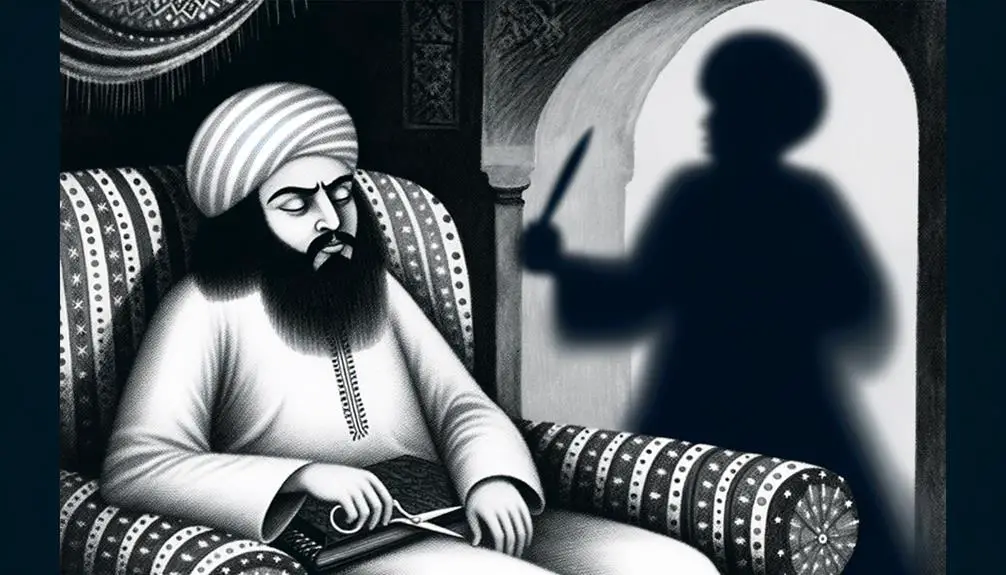Gain insight into timeless biblical distractions, from golden calves to garden temptations, and discover their relevance in mastering modern-day focus.

Distractions in the Bible
Imagine receiving a notification on your ancient stone tablet about the latest golden calf incident; it's a perfect example of how distractions have been derailing focus since biblical times.
You're navigating a world filled with diversions, much like figures from the Bible who faced their own tests and temptations. From the temptation of Jesus to Martha's preoccupation with duties over devotion, these stories offer timeless lessons on prioritizing what truly matters.
As you explore these narratives, consider how the allure of distractions has evolved over time and what that means for staying true to one's path today.
What might these ancient lessons reveal about overcoming distractions in your own life?
Key Takeaways
- Leadership and spiritual guidance are crucial in avoiding distractions and idolatry.
- Spiritual resilience and scripture are defenses against temptations and distractions.
- Material possessions can obstruct spiritual growth and distract from deeper spiritual pursuits.
- Balancing daily responsibilities with spiritual attentiveness is key to overcoming distractions.
The Golden Calf Incident

One of the most telling examples of distraction in the Bible is the Golden Calf incident, where the Israelites, in Moses' absence, turned to idolatry as a misguided means of spiritual fulfillment. This event underscores the profound impact of leadership challenges and the human propensity toward idol creation when faced with uncertainty or absence of guidance.
You'll observe that the incident illustrates a pivotal moment of vulnerability among the Israelites. Their actions weren't merely a lapse in faith; they represented a deeper psychological and spiritual crisis. The absence of Moses, their direct link to God's guidance, triggered a collective anxiety, leading them to seek comfort in the tangible form of a golden calf. This impulse towards idol creation reveals a fundamental aspect of human nature: the need for immediate, visible symbols of security and divine presence, especially in times of distress or transition.
The leadership challenge here is twofold. Firstly, it highlights the difficulty leaders face in maintaining faith and order within their communities, especially in their physical absence. Secondly, it underscores the critical role of leaders in guiding their followers away from the distractions of false idols and towards a deeper, more enduring faith. Moses' reaction to the incident—his anger, destruction of the idol, and intercession for his people—further emphasizes the responsibility leaders bear in reorienting their communities towards the right path.
This narrative invites you to reflect on the continuous struggle against distractions that lead away from true purpose and fulfillment. It serves as a cautionary tale about the dangers of idolatry and the importance of steadfast leadership and faith, especially during times of uncertainty.
The Temptation of Jesus

Reflecting on the Golden Calf incident underscores the timeless nature of spiritual distractions, a theme further explored through the Temptation of Jesus, where personal resolve and faith are put to the ultimate test. In the heart of desert solitude, Jesus confronts the epitome of spiritual warfare, a battle not against flesh and blood but against the very essence of distraction and temptation.
This narrative serves as a profound exploration of spiritual resilience. Jesus's encounter with the devil in the wilderness, immediately following His baptism, highlights the intrinsic link between solitude and spiritual warfare. The desert, emblematic of both physical and spiritual desolation, becomes the stage for this pivotal confrontation. Here, Jesus's fasting and prayer aren't mere acts of piety but deliberate preparations for the trials ahead.
The temptations presented to Jesus—turning stones into bread, gaining worldly power, and testing God's protection—aren't just personal challenges; they're archetypal representations of the distractions that lure one away from divine purpose. Each temptation addresses basic human desires: sustenance, power, and security, reframed as distractions from spiritual fidelity.
Jesus's responses underscore a crucial strategy in combating spiritual distractions: the application of scripture as both shield and sword. His rebuttals, rooted in scripture, don't just deflect these temptations but dismantle their premise, illuminating a path of steadfast faith amidst the allure of transient satisfactions.
This episode encapsulates a fundamental lesson: spiritual warfare demands vigilance, preparation, and the wisdom to discern between genuine spiritual nourishment and the mirage of temptations. It's a compelling reminder that in the solitude of our deserts, one's faith is refined and tested, forging an unbreakable bond with the divine.
Martha's Preoccupation

In the account of Martha and Mary, we encounter a vivid illustration of how daily responsibilities can become spiritual distractions, diverting attention from deeper, divine engagement. This narrative skillfully highlights the tension between hospitality stress and priority balance within spiritual pursuits.
Martha's preoccupation with the duties of hospitality, while seemingly commendable on the surface, subtly underscores a common pitfall: the elevation of service actions over spiritual attentiveness. Here, Martha's diligence in serving isn't critiqued for its intent but for allowing it to overshadow the importance of being present in Jesus' teachings. The contrast with her sister Mary, who chooses to sit at Jesus' feet and listen, sharply delineates the distinction between active service and reflective engagement with the divine.
The text probes deeper into the psyche of spiritual distraction, suggesting that Martha's excessive concern with the minutiae of hosting may stem from societal pressures or personal expectations. This preoccupation not only distances her from spiritual nourishment but also manifests as frustration and agitation towards her sister, indicating a misalignment of priorities.
Analyzing this episode reveals a fundamental lesson in priority balance: the necessity of discerning when to act and when to listen. It posits that true hospitality extends beyond the physical realm, encompassing an openness and attentiveness to spiritual wisdom. Consequently, this account serves as a cautionary tale, urging individuals to scrutinize their motivations and reassess their allocations of time and energy to prevent the overshadowing of spiritual growth by mundane tasks.
The Rich Young Ruler

Shifting focus to the narrative of the rich young ruler, we encounter another profound example of how personal possessions can act as significant spiritual distractions, challenging the very core of one's commitment to divine teachings. This story vividly illustrates wealth's grip on the human heart and its potential to induce spiritual blindness, hindering individuals from fully embracing their spiritual journey.
The rich young ruler approaches Jesus with a question of eternal significance, seeking to understand what he must do to inherit eternal life. Despite his adherence to the commandments from a young age, his encounter with Jesus reveals a deeper, underlying issue: his wealth has become a paramount priority, overshadowing his desire for spiritual fulfillment. Jesus' response, urging him to sell all his possessions and give to the poor, serves not as a general mandate for all followers but as a tailored directive to this individual, pinpointing the obstacle in his path to spiritual depth.
This narrative underscores the subtle yet powerful way material wealth can entangle one's priorities, leading to a state of spiritual blindness where the accumulation and preservation of wealth become ultimate goals, at the expense of spiritual growth and altruism. The rich young ruler's inability to detach from his possessions, despite his initial eagerness to follow Jesus' teachings, exemplifies the perilous journey of navigating one's spiritual path amidst material abundance.
Analyzing this story, it becomes clear that the crux of the matter lies not in the possession of wealth itself but in allowing it to usurp the place of supreme importance in one's life, thereby obstructing the path to genuine spiritual enlightenment and fulfillment.
Samson and Delilah

Delving into the narrative of Samson and Delilah, we uncover a tale that starkly contrasts the spiritual downfall caused by personal relationships, further complicating the journey towards divine adherence. At its core, this story from the Book of Judges exemplifies a profound instance of fatal attraction and misplaced trust, offering a rich field for analytical exploration.
- Fatal Attraction: Samson, endowed with divine strength, falls prey to Delilah's allure. This attraction, though seemingly benign at first, ushers in a series of events leading to his ultimate downfall. It's a vivid illustration of how physical and emotional desires, when left unchecked, can derail one's spiritual mission.
- Misplaced Trust: Samson's decision to confide in Delilah, despite her repeated betrayals, underscores the dangers of misplaced trust. His inability to perceive her true intentions reflects a broader theme of spiritual blindness—a failure to see beyond immediate gratification towards the long-term implications of one's choices.
- Divine Strength vs. Human Weakness: The juxtaposition of Samson's physical strength with his emotional vulnerability offers a critical examination of the dichotomy between divine gifts and human frailties. It illustrates how one's greatest asset can become a point of exploitation when not coupled with discernment and spiritual wisdom.
- Consequences of Disobedience: Ultimately, Samson's liaison with Delilah leads to his capture and demise, highlighting the severe consequences of deviating from one's divine calling. This narrative segment serves as a cautionary tale about the perils of allowing personal relationships to distract from spiritual obligations.
In analyzing the story of Samson and Delilah, it's evident that the intertwining themes of fatal attraction and misplaced trust serve as pivotal factors in Samson's spiritual derailment. This account not only enriches our understanding of biblical teachings but also offers timeless insights into the complexities of human nature and the pursuit of divine adherence.
Frequently Asked Questions
How Do Modern Technologies Compare to Biblical Distractions in Their Impact on Spiritual Life?
In examining how modern technologies affect your spiritual life, it's crucial to consider practices like digital fasting. Unlike ancient distractions, today's screen idolatry can deeply impact your spiritual focus and development.
Engaging in digital fasting, you actively choose to limit these distractions, paralleling biblical teachings on focus and devotion. This practice offers a profound way to mitigate the pervasive influence of technology, fostering a healthier spiritual balance in your life.
What Are the Psychological Mechanisms Behind Distractions According to Biblical Teachings?
You're navigating through a sea of distractions, where your brain's battling giants like cognitive dissonance and attentional shifts. It's like trying to focus while juggling flaming swords.
According to biblical teachings, these psychological mechanisms are akin to internal tugs-of-war, pulling your focus from what matters. Cognitive dissonance creates a mental discomfort, prompting you to shift your attention, often away from spiritual pursuits, highlighting a struggle to align actions with beliefs.
How Does the Concept of Distraction Play Into the Broader Theme of Free Will in the Bible?
In exploring the broader theme of free will in the Bible, you'll find that distractions often serve as Divine Tests, challenging individuals to make Moral Choices. These tests aren't mere obstacles; they're opportunities for you to demonstrate your commitment and discernment.
Every decision you make, every distraction you navigate, reflects your exercise of free will, aligning or diverging from divine principles. Thus, distractions are intricately tied to the essence of moral and spiritual development.
Can Distractions Have Positive Outcomes According to Any Biblical Narratives?
In analyzing biblical narratives, you'll find that distractions can lead to positive outcomes. Take Jonah's detour, for instance. Initially running from his mission, this detour ultimately redirected him towards fulfilling God's plan, showcasing a profound transformation.
Similarly, Balaam's error, another seeming distraction, highlighted the importance of divine guidance over personal intention. These instances demonstrate how perceived distractions can serve as catalysts for growth and alignment with divine purposes.
How Do Different Biblical Translations Interpret the Concept of Distraction, and What Impact Does This Have on Understanding Biblical Lessons on Focus and Dedication?
As you delve into the study of translation variations and interpretive differences, you'll find that the devil's in the details. Different biblical translations can significantly impact your understanding of focus and dedication.
Analyzing these variations reveals how slight shifts in wording can alter the perceived importance of staying on task. Scholarly, detailed examination of these texts shows that interpretive differences can either dilute or magnify the lessons on distractions.
Conclusion
In examining these biblical narratives, it's clear you confront a complex constellation of distractions, divinely designed to delineate the delicate dance between devotion and diversion.
The Golden Calf incident, Jesus' temptation, Martha's preoccupation, the rich young ruler's reluctance, and Samson's seduction by Delilah depict a dynamic diorama of human frailty and the perennial pull of priorities.
These stories serve not solely as spiritual signposts but as profound probes into the psyche, presenting a perennial paradox of pursuit and perception.



Sign up